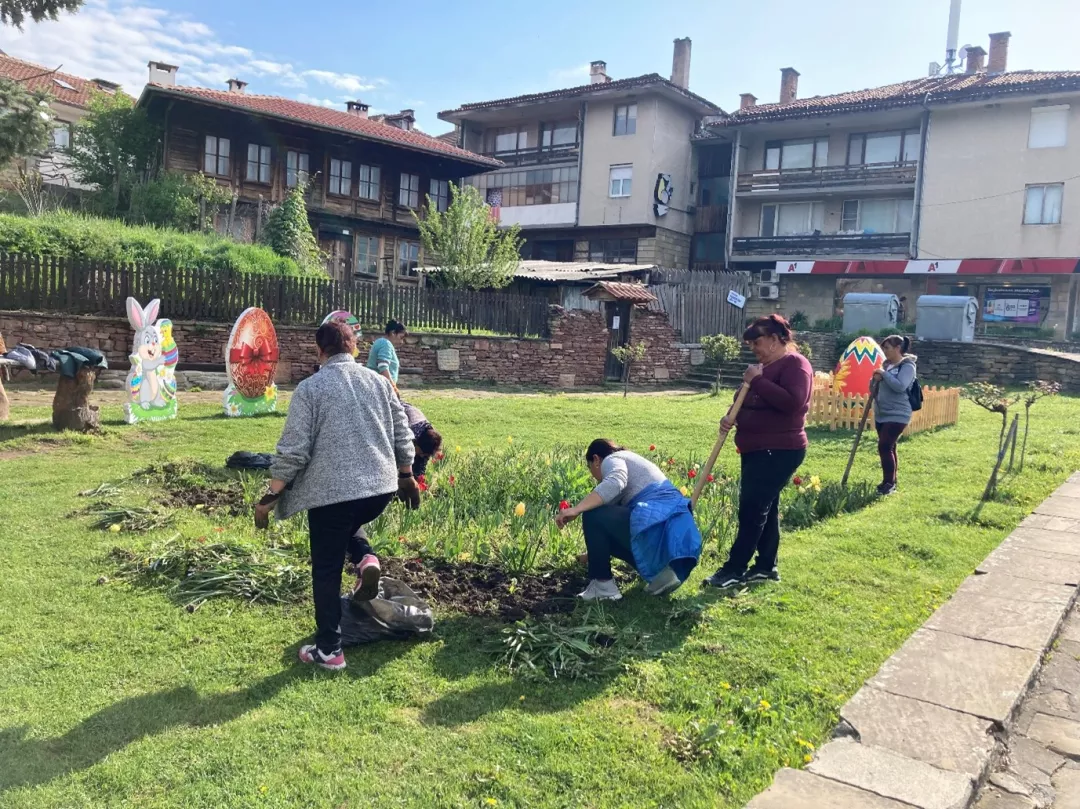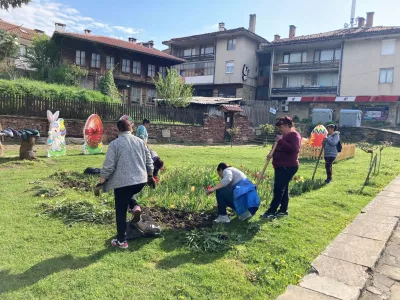Summary
Ticha is a village in the municipality of Kotel, in the centre of Bulgaria. The NGO People´s Community Centre “Prosveta-1870” implemented an ESF project to facilitate access to employment and social inclusion of people from vulnerable groups in this rural area. The initiative not only provided participants with social entrepreneurship skills, but also allowed the creation of a green social enterprise employing 17 people at risk of social exclusion, which is now providing new services in six villages of the municipality.
Results
As a result of the project, a social enterprise was created in the community centre, consisting of a new unit specialised in landscaping and maintenance services. The company’s employees, 17 residents from vulnerable groups in the area, carry out garden maintenance, cleaning and protection services, as well as small repair jobs, in Ticha and in five other villages of Kotel municipality.
The project was made possible thanks to three volunteer mentors who supported the creation of the social enterprise and the overall awareness-raising campaign conducted by the centre to identify participants and mobilise support.
To set up the company, the project beneficiaries repaired existing premises in the community centre, including a workshop and a warehouse for inventory and materials, and the project covered the costs of part of the equipment necessary for the services of the new company.
Resources
Documents
Context
The village of Ticha, in the province of Sliven, has a declining population of less than 800 inhabitants (786 in the 2021 census, almost 400 fewer than two decades earlier). The area faces several structural challenges, such as a rapidly shrinking and ageing population and an unemployment rate above the country's average, with many adults of working age inactive and with low or no qualifications, especially among vulnerable groups.
'Prosveta-1870' is a community centre in Ticha, whose main objective is to create, preserve and spread cultural values and develop creative skills for any citizen, whatever their age, gender, party, ethnic or religious affiliation. Concerned about the village’s challenges, the centre created a project to support vulnerable inhabitants to acquire new skills, obtain social and psychological support and, ultimately, improve their socioeconomic integration.
Objectives
The ESF project 'Social Entrepreneurship without Borders in the Kotel Municipality Territory' led by the community centre in Ticha aims to promote the socioeconomic inclusion of people from vulnerable groups in the village and surrounding rural area by providing them with social entrepreneurship skills and knowledge that can create the right conditions to obtain a job in the social economy sector.
Activities, key actors, and timeline
The project started with the identification of participants among unemployed people in Ticha and neighbouring villages in the municipality of Kotel. They received support for the preparation of documents and orientation about the social enterprise as a means for labour market integration.
After the selection process and a test period, participants were trained in landscaping by volunteer mentors and obtained 11-month employment contracts. To set up the social enterprise, project participants and volunteers repaired some empty premises of the centre and obtained equipment for the workplace using part of the project funding.
The social enterprise started operating at the beginning of 2022 with 16 landscaping workers and a technical coordinator. In addition, activities for social marketing and promotion of the social economy and the social enterprise’s model were carried out – for example, outdoor festivals were organised to showcase the social enterprise's activities.
Success factors/Lessons learnt
This project represented a challenge for the village’s community centre, which had never before carried out an initiative of this magnitude. It provided an opportunity to transform the centre with the creation of a new support model for vulnerable groups that can be scaled up, as well as a new social enterprise within the centre that is generating employment in the area and helping to prevent an increase in the negative demographic process.
The project was innovative since it created a social enterprise, a model previously unknown in this territory, aimed at people excluded from the labour market. It also involved capacity building, not only for the beneficiaries of the project, but also for the centre itself, which is now able to carry out larger-scale projects.
Also noteworthy is the work carried out by the community centre to banish stereotypes that help change the concept of the capacities of vulnerable groups to be leaders of social projects or service providers, as well as its efforts to maintain an active dialogue with the different municipalities to find common solutions at the local level.
Contacts
Petya Shivarova, LAG manager, vomrkotel@gmail.com

